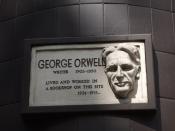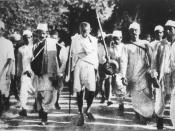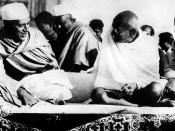Wide spectrums of attitudes arise when comparing and contrasting the writings of Gandhi and George Orwell. The oppressive British system of government in India provides the motive for Gandhi's "Defending Nonviolent Resistance" speech. George Orwell conveys peevishness of the same system--the British government by the shooting of an elephant and the repercussions of the event. The overall attitude in Orwell's Shooting an Elephant leans toward resentment of both government and murder, while the overall attitude in Gandhi's Defending Nonviolent Resistance inclines toward the uprising of government and nonviolent protest. Both writers share attitudes, however both writers convey opposing attitudes towards their government.
Mohandas Gandhi emphasizes the use of non-violence in his speech and employs the principle of "spiritual leadership...to achieve political goals through non-violent resistance."(Gandhi 975) Gandhi's essay accents the need for Indian freedom. Gandhi's attitude stressed for the British system of government to change. Gandhi states the overall attitude of the essay, "I wanted to avoid violence, I want to avoid violence.
Nonviolence is the first article of my faith. It is also the last article of my creed." (Gandhi 976) Gandhi writes this to state his belief in nonviolent forms of rebellion. Instead, Gandhi's belief that peaceful measures harvest a greater impact on the people creates a greater outcome. Gandhi decides to go against the government of the land, the British government. Gandhi states, "But I had to make my choice. I had either to submit to a system which I considered had done an irreparable harm to my country, or incur the risk of the mad fury of my people bursting forth, when they understood the truth from my lips" (Gandhi 976). Clearly, Gandhi's attitude towards British rule played into a negative path of rebellion which eventually led to his arrest and future Indian independence.


